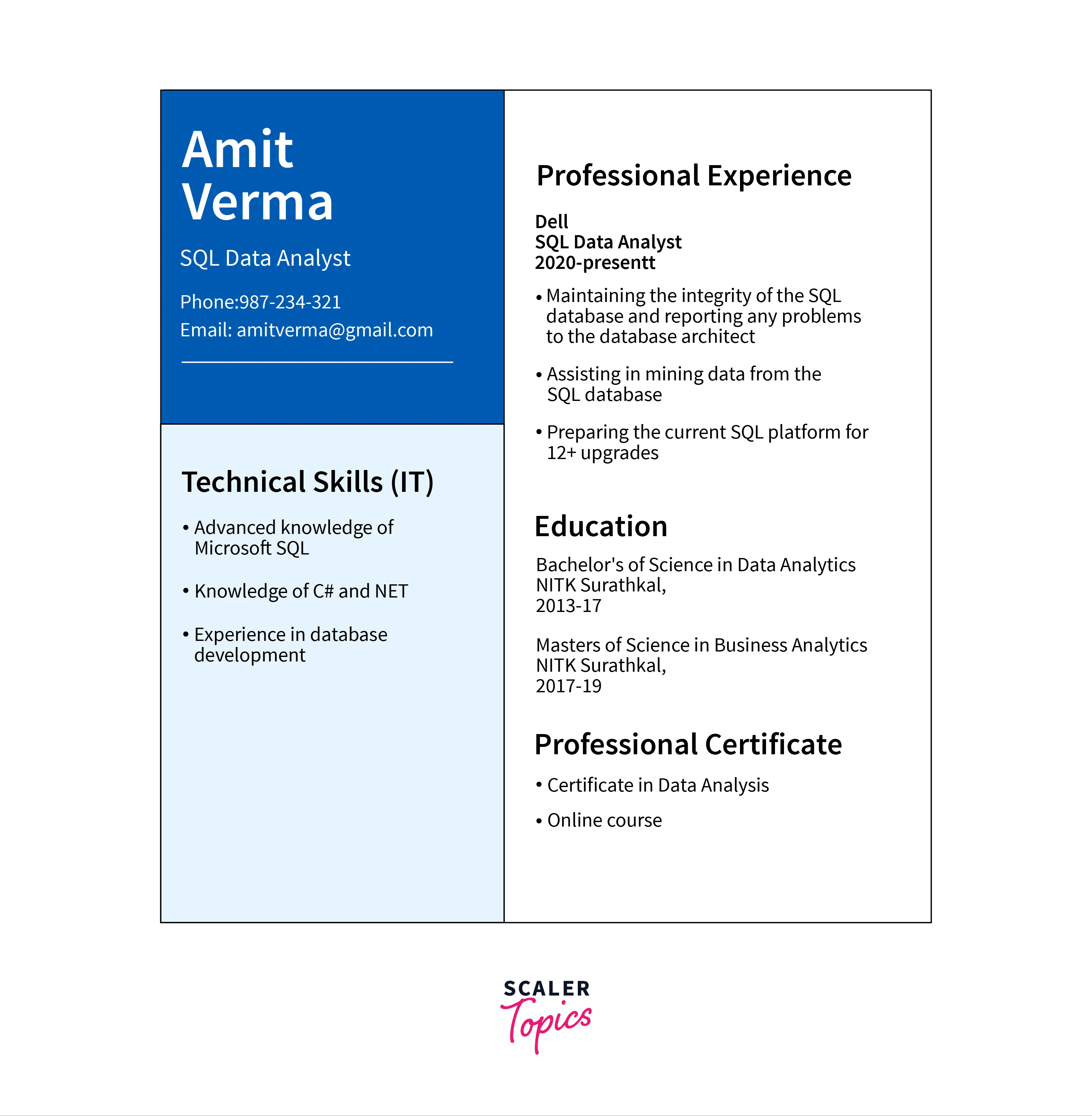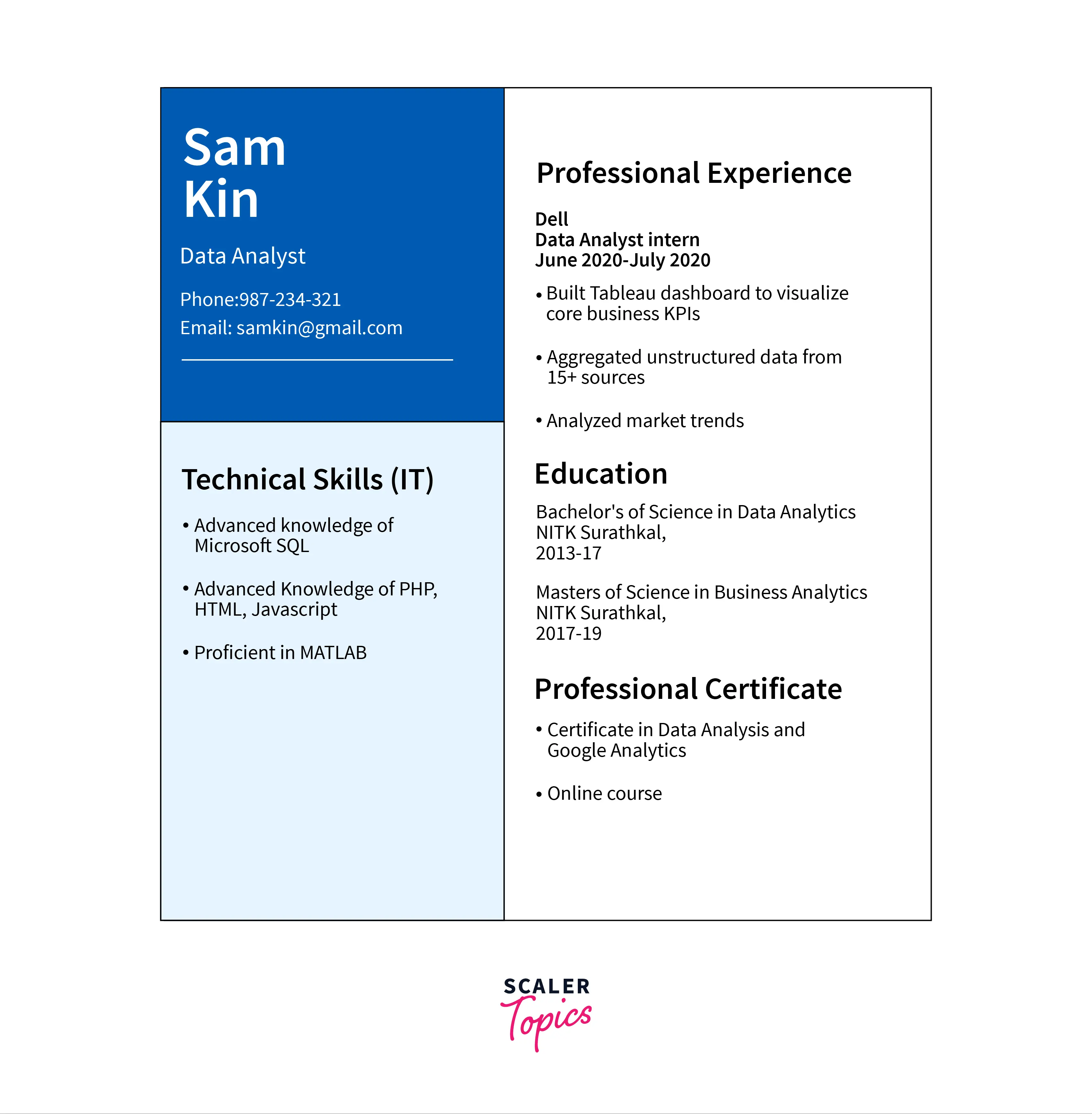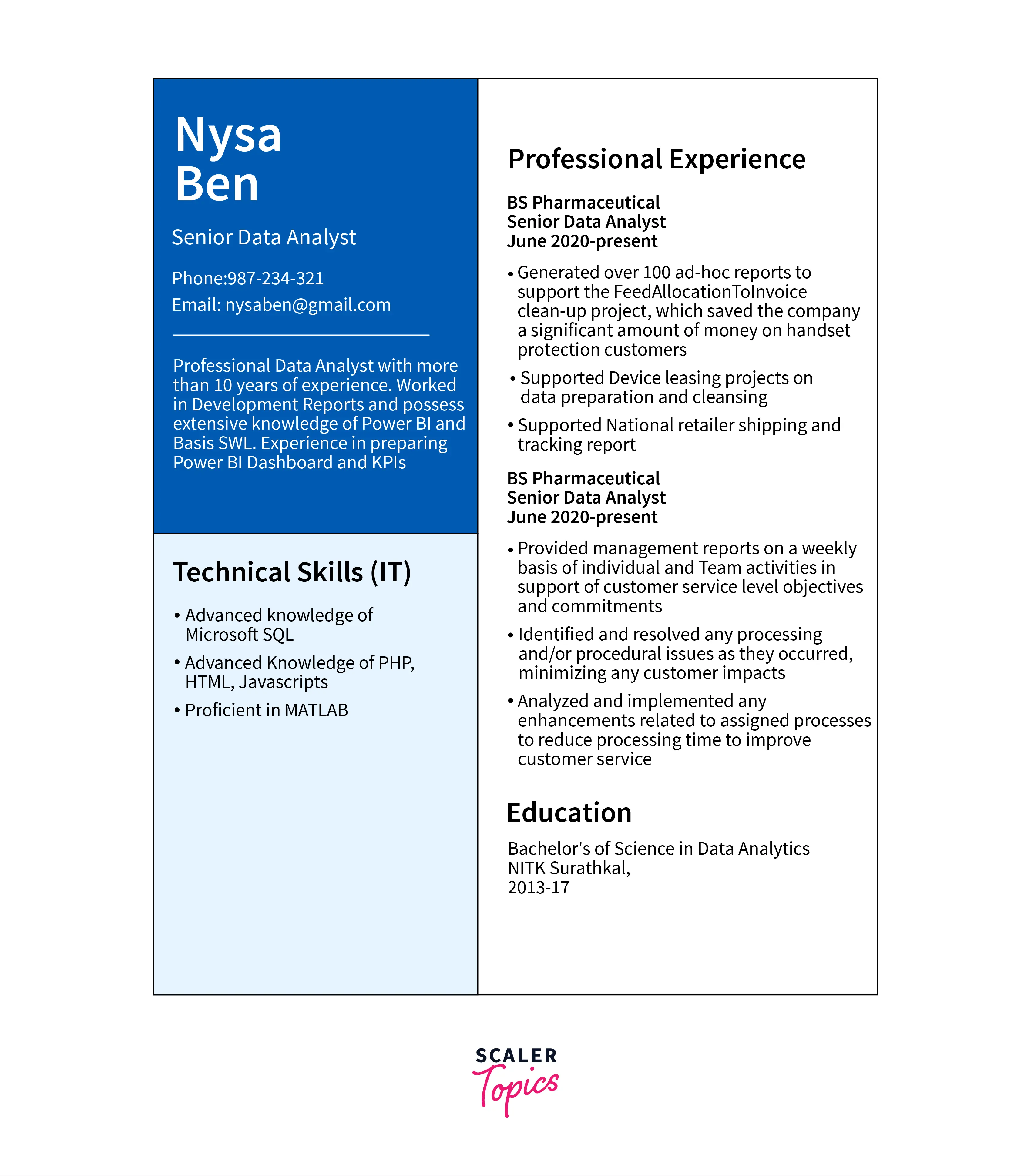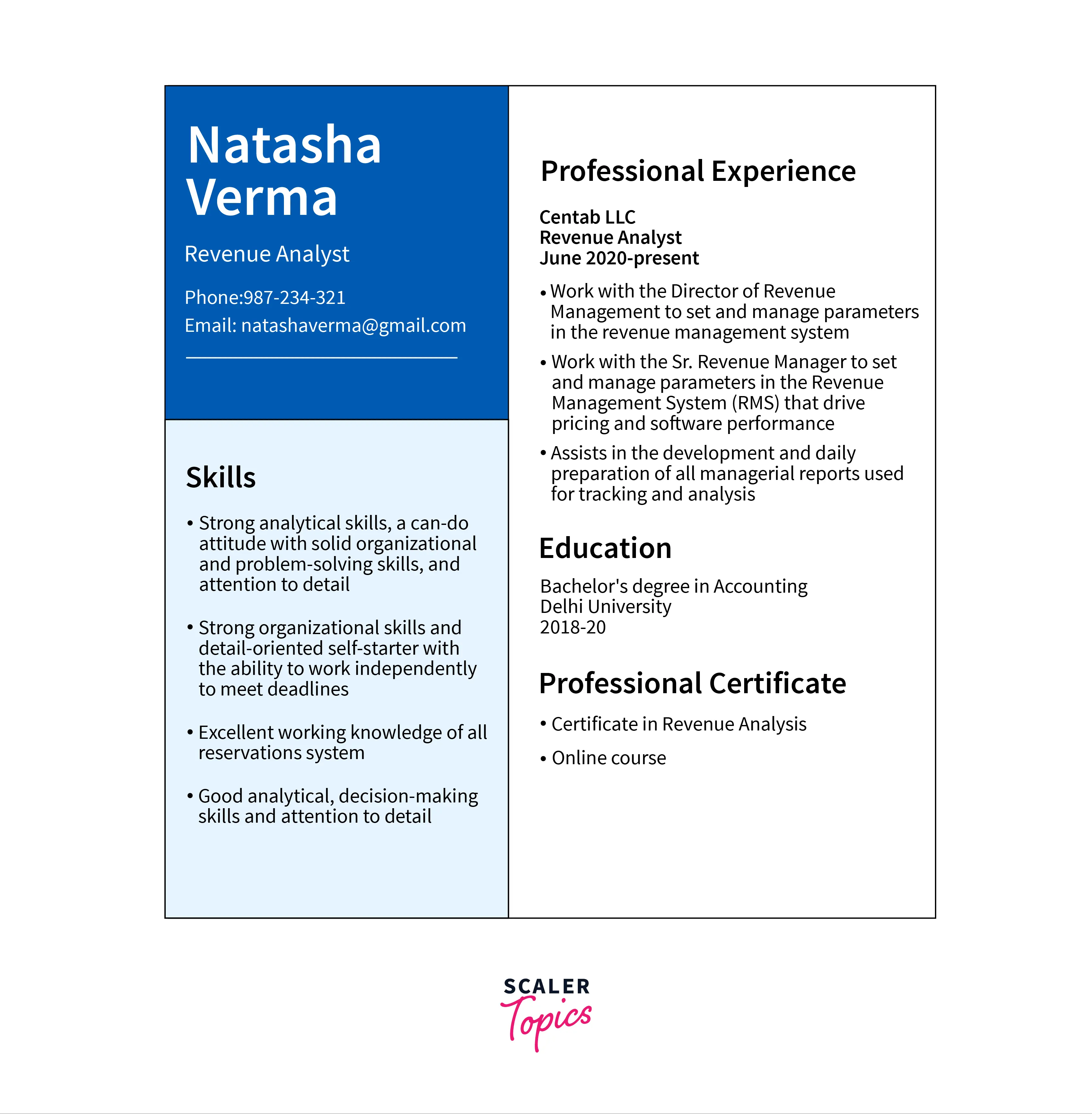Data Analyst Resume - Guide & Examples For 2023

Introduction
There is no doubt that today’s world runs on data. With the advent of Smartphones and the Internet, our world is generating a huge volume of data on a daily basis. Organizations worldwide have realized that it is essential for them to analyze the data they generate for their success and growth. So, they have already increased their investment to implement Big Data and Analytics solutions to drive their business decisions.
This has led the demand for Data Analysts to surge in recent years, and this demand is expected to grow in the next decade as well. The World Economic Forum has identified Data Analyst as one of the fastest growing jobs for 2020-2030. Also, Data Analysts are one of the highest-paid professionals in the world. It is evident that the Data Analyst job profile offers a great career path and high salaries.
As more students and experienced professionals have decided to build their careers in the Data Analytics field, roles have become competitive. With hundreds of qualified candidates applying to every open Data Analyst role, your resume needs to stand out from the crowd to get your first job as a Data Analyst. On top of that, based on a study performed by Eye Tracking, recruiters spend just 7.4 seconds on average on a resume. So if you are in job hunting mode and applying for the Data Analysts role currently, you have fierce competition to handle and less than a few seconds to leave a strong impression on the recruiter. To do this, you must have a clear, precise, relevant, and impactful Data Analyst resume.
This article provides a comprehensive guide to preparing a Data Analyst resume to make it strong, impactful, and compelling.
We will also explore resume samples for various Data Analyst profiles such as Entry-Level Data Analysts, Senior Data Analysts, etc.
Why is a Data Analyst Resume Important?
A resume is the first step before applying for any job application. Organizations would expect hundreds of qualified candidates to submit their resumes and cover letters to fill a position. Then organizations or recruiters go through all these submitted resumes and filter out the relevant set of people among all candidates for the interview process.
To filter out the best candidates, organizations or recruiters do not thoroughly review the resumes. They just scan the resumes and look for specific information about your profile. So without a strong resume, getting any job in any industry is almost impossible.
Demand for Data Analysts has skyrocketed in the past few years, and it is also expected to grow in the next decade. So a strong and impactful Data Analyst resume can help you get jobs that are the right fit for your skillset and experience.
Though, the right Data Analyst resume can help you in many other ways.
- Stand Out From The Crowd
- As you now know that recruiters spend less than a few seconds on a given resume, by creating a strong resume, you can showcase why you are a perfect fit for this role by highlighting your skills and work experience in the best possible way. This will help you stand out from the crowd and will leave a strong impression on the recruiter and hiring manager.
- Drive Interview Conversation
- In most of the interviews, interviewers start asking the conversation from your resume only, such as a discussion on your past projects, questions about the skills you have mentioned, etc. By putting the right information in your resume, you can drive the interview conversation in the right direction, increasing your chances of getting selected.
What Should You Include in Your Data Analyst Resume/Resume Format?
While scanning through a resume, recruiters or organizations looking for a few sets of things such as its format, relevant work experience, skills, educational background, project details, etc. To make your resume strong and impactful, you must include all this information while preparing resume.
In this section, let’s discuss in detail what you should add to your Data Analyst resume.
Name and Contact Information
- Name and contact information are must-include information because once your resume is shortlisted, the employer would want to reach out to you to schedule the interview process. As this is just functional information, keep it concise and double-check that it is correct.
- Make sure you include the below information in your resume as your contact details -
- Name
- Email ID
- Phone Number
- LinkedIn or GitHub Profiles, if any.
Employment/Work Experience
- This is the most important section for a Data Analyst resume as work experiences or practical applications are always preferred over theoretical knowledge when applying for jobs in the Data Analytics field. This section will reflect how well you have performed as a Data Analyst in your tenure with previous employers.
- If you are a fresher or recently graduated, you must make sure to include the details of your previous internships, final year, or personal project details.
- If you are an experienced professional, make sure to include the below items to showcase your professional journey clearly -
- Your employment should always be mentioned in reverse chronological order, i.e., your most recent work experience should appear at the top of this section.
- Mention your designation, name of the employer and team, and work duration.
- Summary of your core responsibilities.
- Make sure to mention all the tools and technologies you used working as a Data Analyst.
- Always demonstrate your business outcomes in a way that can be quantified. For example, I analyzed a marketing campaign and identified various factors which helped improve sales of the products by 10%.
- Add any accomplishments such as rewards, recognitions, etc.
- Let’s see an example in the below table to compare a good and a bad way to write the work experience in your resume.
| Right | Wrong |
| June 2014-May 2015
ABC Retail, Bangalore
| ABC Retail, Bangalore
|
Projects
- This section would help demonstrate your hands-on experience and capabilities to the hiring manager or recruiter.
- While writing down the project section, you should consider the following points -
- Relevance - You should not include all the projects you have worked on. Instead, ensure to include the projects most relevant to the job you are applying for.
- Objective - Make sure to write down the business objective of each project i.e. what is the outcome you are trying to achieve through this project? For example, the objective of this project is to improve sales of the products by analyzing the effectiveness of marketing campaigns.
- Technical Details - Make sure to include all the tools and technologies, such as which visualization software you used to create the dashboards, which programming languages you used to collect and analyze the data, etc.
- Impact/Outcome - Make sure to include the impact of your project in a quantifiable manner. For example, I analyzed the marketing campaign and sales data, identified factors affecting the sales of the products, and proposed recommendations, leading to an increase of 15% in sales.
Skills
- The first person who scans your resume is often a recruiter who does not have the right technical expertise to evaluate your profile. Some employers also use automatic resume scanning systems to automate the screening process.
- Thus, it is important to put the right set of skills in this section to make your resume relevant for the role. You should keep this section as short and specific as possible. Also, you should include all the relevant skills for the job you are applying for.
- Let’s see an example in the below table to compare a good and a bad way to add your skills to your resume.
| Right | Wrong |
Skills
| Skills
|
Education
- Make sure to mention all of your educational qualifications in reverse chronological order so that your master's or Ph.D. degrees must appear at the top, and make sure to include your university name and the year of graduation.
- If you have completed any certification in Data Analytics or related fields, you must also include them.
Awards or Recognitions
- Apart from your employment-related recognitions, if you have any other accomplishments such as paper acceptance, Kaggle or other Data Analytics related competition results, etc., you must make sure to include them in this section.
- Make sure to include the name of the institution or body, what you were awarded for, and when you received it.
How to Write an Effective Data Analyst Resume (Tips)?
We have laid down some of the tips that can help you write a strong and impressive Data Analyst resume.
- Keep Data Analyst Resumes Brief
- Make sure to keep your resume short, specific, and concise. A good resume should be finished within one page unless you are very experienced or applying for a senior role.
- Make sure to remove all the information which are not relevant to the roles and responsibilities of the job you are applying for. So, even if you have worked on tons of projects, you should include only the relevant ones.
- Customize Each Resume to the Job Description and Company
- Though you can create a single Data Analyst resume and use it to apply for all the jobs. But it is recommended to tweak your resume for each job you apply for, to add a personalized touch to it.
- You don’t need to re-write the entire resume to customize it each time you apply for a new job. You can go through the job description and company profile and highlight or add the points which will make your resume relevant to it. For example, you might want to put the projects on the top which belong to the same domain as the company you are applying for. Another example could be highlighting your projects showcasing the relevant technical skills required for the job.
- Choose a Good Template and Design
- To make your resume visually appealing, you should spend some time choosing the right template. To choose the right one for you, you can explore many free templates available online.
- Tips for resume formatting - You should consider the below points while formatting your Data Analyst resume -
- Keep your resume short, preferably to one page wherever possible. Save it as a PDF before sending it for the job application
- Keep font size to 10, 11, or 12 points.
- Stick to a consistent date format throughout the resume.
- Use bold, italics, and underlining formatting to break up the text
- Use bullet points to describe your work experience instead of writing paragraphs
- Choose an easy-to-read font for your resume. A few common examples of fonts used are - Times New Roman, Cambria, Georgia, Helvetica, Calibri, Arial Narrow,, etc.
- What to Avoid - Now, let’s discuss what you should avoid while preparing your Data Analyst resume.
- Try to avoid sharing too much information. This can be counterproductive.
- Do not share your personal information which is not relevant to the job.
- Avoid any kind of spelling or grammatical errors. Make sure to double-check that your resume is accurate before sending your resume.
- Don’t lie about your accomplishments, skills, or education.
Data Analyst Resume Examples
Basic Data Analyst Resume Sample
- It is important to include every bit of experience possible in a general Data Analyst resume. You can go through the target company details and job description and give it a personalized touch by putting the relevant set of skills and projects in the resume.
- You can refer to the below template for a Data Analyst resume as it includes work experience and skills in a clear, concise, and specific manner. It also includes clear, quantifiable business outcomes in the projects section.

SQL Data Analyst Resume Sample
- For a SQL Data Analyst resume, make sure to demonstrate your SQL-based skills in a clear and specific manner. Make sure to include the names of all the databases you worked with using SQL.
- Below resume template for SQL Data Analyst works well as it showcases SQL-based skills in a clear manner along with the quantifiable impact of the projects.

Entry-Level Data Analyst Resume Sample
- Organizations judge the potential instead of past work experiences for an entry-level Data Analyst role.
- Below template for the entry-level Data Analyst position works well as it clearly showcases the career objective, past internships, project details, skills, and relevant courses studied at the university.

Senior Data Analyst Resume Sample
- Senior Data Analyst resume should focus on demonstrating work experience on a diverse set of projects, quantifiable business impact and outcomes, and leadership capabilities.
- This template for a Senior Data Analyst resume highlights the work experience section in a clear and organized manner. Each past work experience has emphasized quantifiable business impact along with leadership capabilities.
- It also shows career progression from Data Analyst to Senior Data Analyst in a clear manner.

Revenue Reporting Data Analyst Resume Sample
-
While writing a revenue reporting Data Analyst resume, you must make sure to include all the relevant skills for this job in an adequate manner. You can refer below template while preparing your resume for this role.

Ways to Quantify the Impact of Your Analytics Work
We have laid down a few examples of how you can quantify your business impact or outcome while preparing your Data Analyst resume.
- Improved Customer Conversion Rate
- Used Python and SQL as programming languages to propose a specific change in the landing page, resulting in a 10% increase in the free trial activation rate.
- Reduced Costs
- Used SQL and Excel to analyze worst-performing vendors' data and recommended contract termination which led to cost savings of 100,000 USD annually.
- Improved Customer Satisfaction
- Used SQL and Excel to analyze common complaints amongst new customers and proposed recommendations that improved customer satisfaction by 14%.
- Built Data Visualizations to Help Executives
- Built Data Visualizations in Tableau to demonstrate the efficiency of the marketing plan, resulting in a 10% sales improvement.
Where to Find Data Scientist Analyst Templates?
You can explore tons of free templates available online for preparing your Data Analyst resume. We have created a list of top websites to help you finalize a good Data Analyst resume template that fits your skills and role requirements.
Conclusion
Now you know why you need a strong, impactful, and relevant resume to increase your chances of getting a Data Analyst job. Using this guide, you can prepare your Data Analyst resume or update your current resume. Once you have the right, relevant and impressive resume in your hand, you have already taken a big step towards your first or next Data Analyst job.
Make sure to select the right template based on your skills and role requirements, and keep your resume always short, precise, and specific. Once it is prepared, do not forget to double-check for any grammatical or spelling errors.
If you want to start a career in Data Analytics, check out Scaler’s Data Science Program.
